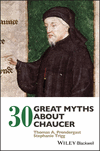CHAUCER DESCRIBED HIMSELF IN HIS WORKS
Summary
One of the presiding structural myths about canonical literary authors is that their works are in some way co-extensive with, and expressive of, their “real” personalities, and Chaucer is no exception. Certainly there are a number of places in his poetry where Chaucer does seem to describe himself, although as we might expect, he sometimes conflates physical attributes with personality traits and psychological conditions. For example, in his earliest narrative poem, The Book of the Duchess, the narrator describes his physical ailments of insomnia and depression, and hints that these derive from unrequited love. Chaucer is sexualized as someone who should be attractive, in an unthreatening manner, to women; but he also appears to be someone who does not welcome human interaction. Chaucer's self-presentation in his poetry is often structured around the question of heterosexual relationships: whether he is likely to appear attractive or unattractive to women.



